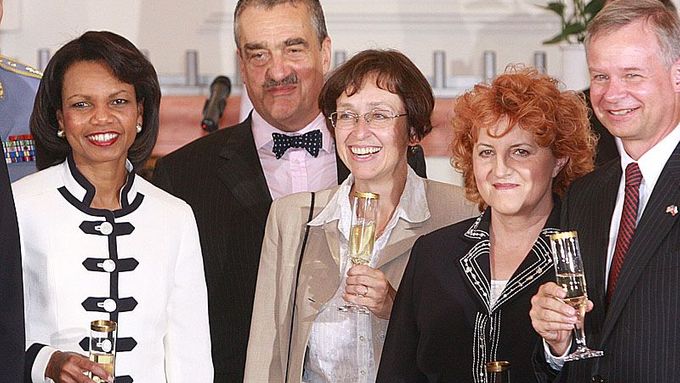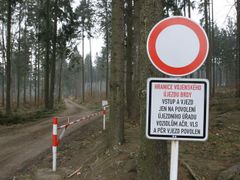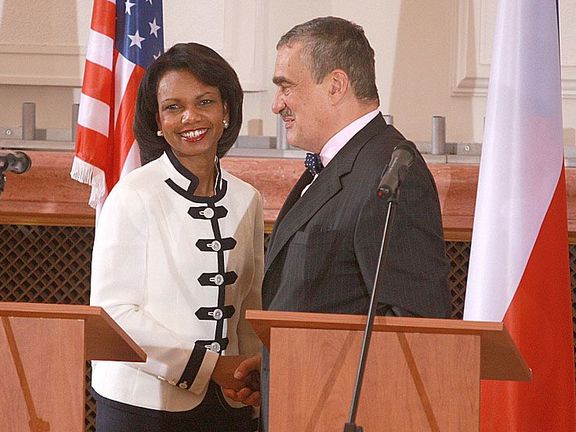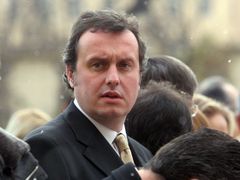Prague - The negotiations about hosting a proposed American military radar base on Czech soil were repeatedly described as „tough" by the representatives of both sides. But does this claim hold true under closer inspection? Hardly.
When asked by members of the press today to name the single most difficult moment of the 18-month negotiating process, the chief negotiators Tomáš Pojar and John Rood failed to come up with any.
"There has not been a major impasse in the negotiations," said John Rood, Assistant Secretary of State for International Security and Nonproliferation, during a briefing at the Czech Foreign Ministry.
Rood's Czech counterpart at the negotiating table, Deputy Foreign Minister Tomáš Pojar agreed, taking pains to stress that the Czech side "has gone the extra mile" and actually checked on some of the clauses from existing agreements with third parties that the Americans kept invoking or referring to.
The greenest US treaty ever?
Both Rood and Pojar pointed to the Article XV of the treaty, which deals with the protection of the environment at and around the base, and called it "unprecedented" in its scope.
With its nine paragraphs running across almost three pages, it certainly is the longest part of the 18-article, 22-page document and in the words of John Rood, it "provides for stronger environmental protection than any other agreement (of this type) the US has committed to".
But the executive director of Greenpeace Czech Republic Jiří Tutter is anything but impressed. Going through the "green" passages of the treaty, which has been made public the day after it had been signed, he discovered a number of what he considered weak spots.
„The treaty does not prescribe any sanctions for violating its provisions, not even in general terms, in fact it stringently avoids the term sanctions altogether. There are only ,consultations' to fear in cases of even grave endangerment of the environment or health. What if these consultations do not lead to immediate redress?" stated Tutter, alarmed, in his reply to Aktuálně.cz's request.
"The language (of the treaty) is too vague and it leaves room for various interpretations, which might be confounding even to a court, if it should come to one," he opines and offers a handful of other objections.
"All in all, without further explanation by the Czech government, we consider it rather audacious to call this part of the treaty a success as done by (the Deputy Prime Minister and Green Party leader) Martin Bursík," Tutter added.
Standard air defense
Unlike Poles, who are still holding out in the talks with Americans, hoping to gain what they want, Czechs have not demanded that the future base be protected against a possible ballistic missile attack despite numerous threats made by Russia to aim nuclear missiles at central Europe if the American shield is deployed there.
Russians consider it a threat to their own security and refuse to accept Washington's official stance that the system's sole purpose is to contain the danger coming from the likes of Iran and other "rogue states" in the Middle East.
"We are used to hearing these kinds of threats coming from Russia ever since we applied for the membership in NATO. It is all recycled rhetoric and doesn't surprise us any more," Deputy Minister Pojar played down the latest wave of threats from Moscow.
The radar base in Brdy, west of Prague, will thus be subject to standard protection provided by Czech air defense, propped up by the guarantees of allied help from other NATO members.
Russian inspections? Yes, but…
There is still an option to grant Russians access to the base, but it is not likely to be of permanent character, as called for by the Russian ambassador in Prague Alexei Fedotov in a recent interview on Czech TV.
"We could work out an arrangement under which military attachés, accredited in Prague as part of the Russian diplomatic mission, would be able to access the base. But not before getting a nod from the Czech side and of course the American side," Tomáš Pojar explained.
"We are ready to discuss details of the particular mechanism any time," he said, adding that so far the Russians have not shown interest in such talks. But there would be clear red lines in these negotiations, he rushed to point out.
"We do want to provide transparency, but it must be clear there will be no Russian base at Czech territory, or even within the American base. I do believe agreement is possible, if it is indeed transparency (that the Russians are concerned with)," said Pojar.
Interceptors still in the picture. Or are they?
Americans remain hopeful there will eventually be a base with ten interceptor rockets in Poland, forming part of the same system the Czech Republic has now joined (pending the ratification of the treaty in the parliament, of course, which is another thing).
They do so despite the fact the talks hit a snag last week when Polish government announced the American offer is unacceptable to them as it stands.
"We are still committed to the negotiations with Poland," confirmed John Rood. "We are in the final phase of the talks, down to the last couple of issues. However, if it fails we will find another country."
And if it fails again? Is there a possibility the radar in Brdy will stand on its own, without a twin base and interceptors?
"Anything is possible. The only certainty you have in life is death," said Rood, refusing to rule out the option of a lone radar station in the heart of Europe.
Scientific bonanza? All glitter
The Czech negotiators have followed a different path. Unlike their Polish colleagues, they have not pushed Americans to help them modernize the armed forces, although experts say a major overhaul would be in order.
Instead, Prague used the opportunity to reach a deal with the American side on possible cooperation in the field of missile defense research and development, creating an opening for Czech scientists and companies. That, the government believes, is the real potential goldmine.
"We have had a different priority from Poland," Pojar confirmed. "For us, the research and development cooperation has the biggest added value."
He said he believed Czech firms and Czech scientists stand to benefit and expects them to jump for the opportunity in next months and years.
His optimism is completely lost on Jiří Dienstbier though. The first foreign minister of the post-communist (pre-separated) Czechoslovakia called the promised participation of the Czech subjects in the mutual scientific projects "a mere glitter".
"In the age of globalization, openness to the world and freedom of movement of everything from thoughts to information and capital, one can start cooperation even without the governments and radars. It is useful, but not necessary to have a backing of the government, if we can prove our quality or offer it for a better price than the others," he wrote in a recent blog posting for Aktuálně.cz.











